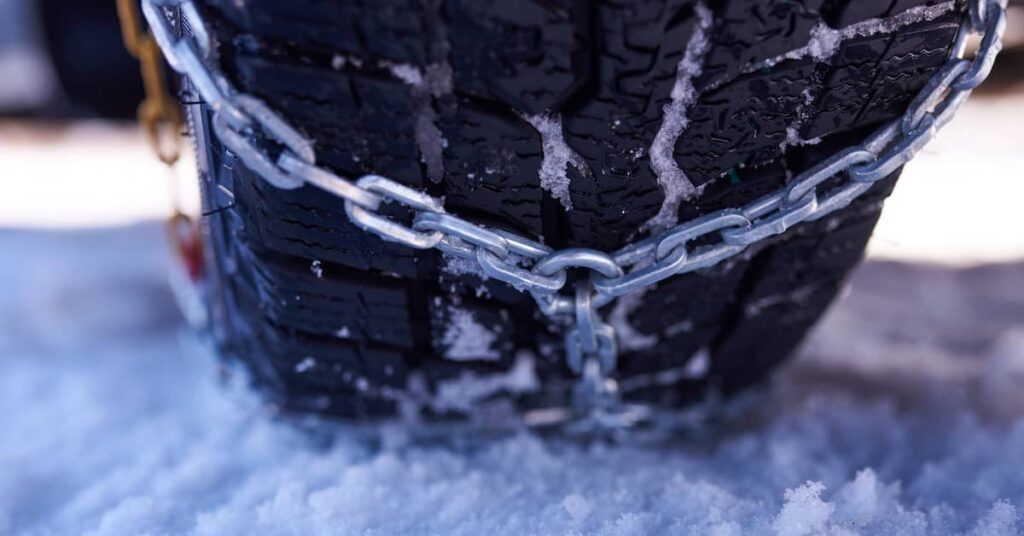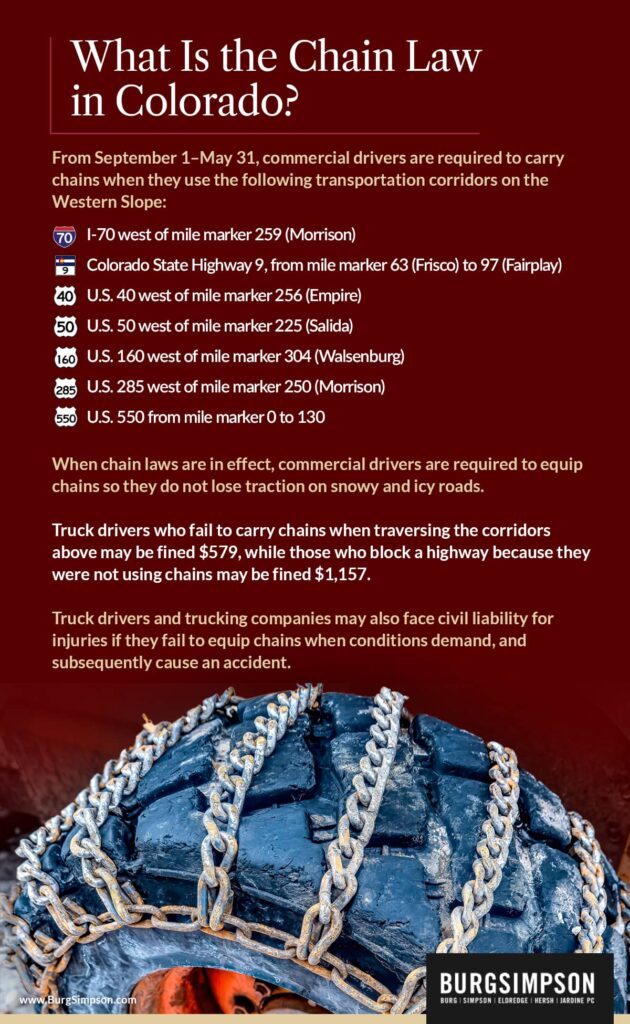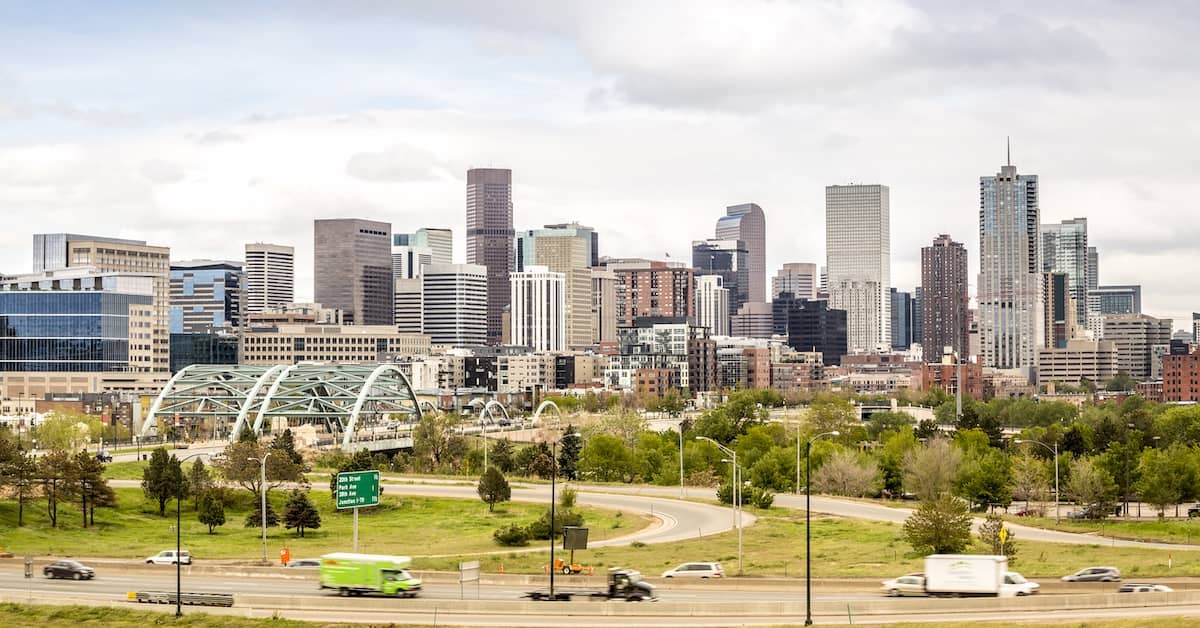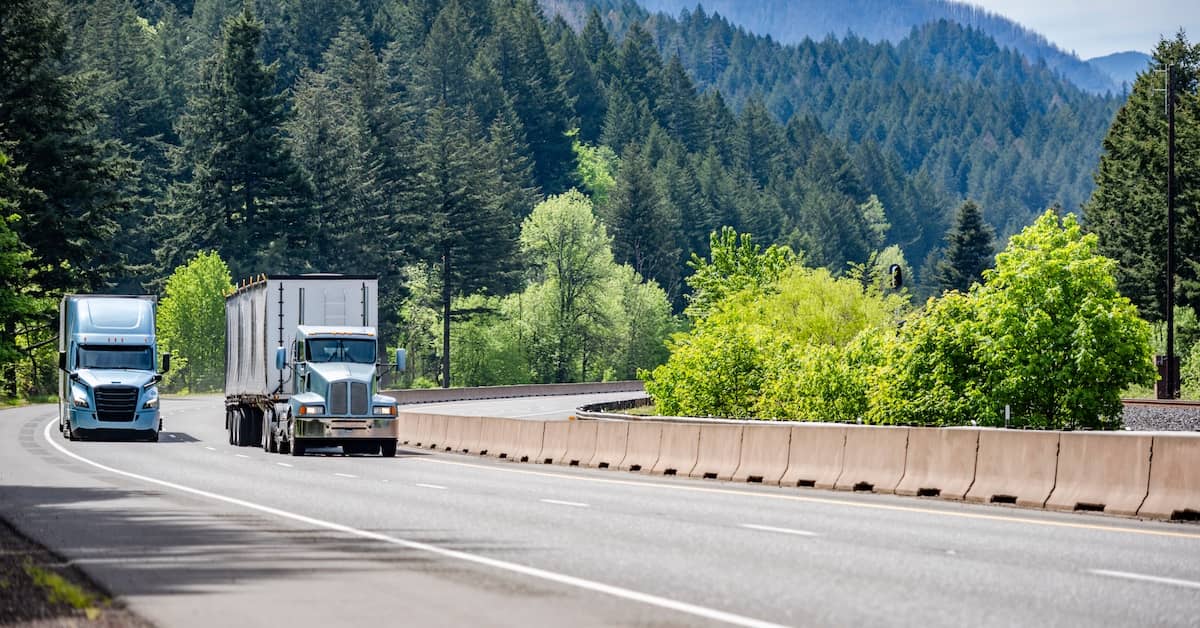
Colorado’s Expanded Chain Law: What Truck Accident Victims Need to Know
In September of 2024, Colorado’s chain law was expanded. It now includes several additional routes where chains are required for commercial vehicles from September through May of each year (see SB24-100). Our mountains do not provide a reliably safe passage for truckers during the winter months. When extra caution is not taken (or Colorado’s chain law is ignored), everyone on the road is at increased risk of serious injury.
National data indicate that weather plays a significant role in serious truck crashes. According to the Federal Highway Administration, right around 50% of all weather-related traffic accidents involve snow and sleet or icy and slushy pavement. Commercial vehicles can struggle in the high country when conditions are optimal. When the weather is poor on the steep, winding corridors of Colorado’s mountains, a semi that loses traction can block lanes for hours or, worse, slam into smaller vehicles, causing catastrophic or even fatal injury.

These issues have long been addressed on I-70 through various safety campaigns, including chain requirements during the winter months. Now, lawmakers have expanded those requirements to other commercial routes statewide.
If you were hurt in a truck accident because a truck driver ignored Colorado’s expanded chain law, that violation could strengthen your civil claim. The experienced truck crash lawyers at Burg Simpson are here to review your case, free of cost and commitment, to help you determine the best way to seek compensation.
Contact a Colorado Truck Accident Lawyer for FREE
To schedule a FREE case review with a qualified and dedicated attorney, call the Denver office of Burg Simpson at 303-792-5595 today. We help victims of serious injury in and around Empire, Salida, Walsenburg, Durango, and throughout the State.
Colorado’s Commercial Vehicle Chain Law: An Overview
Colorado’s chain law requires traction-enhancing equipment on any commercial vehicle with a gross vehicle weight rating (GVWR) of 16,001 pounds or more from September 1 through May 31 of each year. However, while traction devices like chains are required to be carried during this time, they only need to be used when the weather demands.
In Colorado, truckers have long been required to put on chains west of Morrison (milepost 259) on I-70. They still are. As of September 2024, commercial drivers must also chain up during conditions on:
- Colorado State Highway 9 from Frisco to Fairplay (mileposts 63 to 97)
- U.S. Route 40 around Empire (west of milepost 256)
- U.S. Route 50 around Salida (west of milepost 225)
- U.S. Route 160 around Walsenburg (west of milepost 304)
- U.S. Route 285 around Morrison (west of milepost 250)
- U.S. Route 550 from Durango to Montrose (mileposts 0 to 130)
For commercial drivers, failure to carry chains on these routes can result in a fine. Failure to chain up when required can see that fine doubled in most municipalities, with some, like Vail, imposing even higher penalties for unchained rigs that snarl traffic.
Truckers who do not chain up do more than slow traffic down, though; they wreck lives.
When your life is forever changed by the negligent actions of a commercial driver, you may have the option of seeking compensation for medical expenses, lost wages, pain and suffering, and so much more.
At Burg Simpson, our Colorado truck accident lawyers have decades of experience helping injured individuals and grieving families seek justice. During your complimentary consultation, we will listen to your story, discuss how Colorado’s chain law might influence your case, and help you understand what you may be eligible to pursue.
Which Commercial Vehicles Does Colorado’s Chain Law Apply To?
According to the Colorado State Patrol, Colorado’s chain law applies to:
- Straight Trucks
- Single Drive Axle Combinations
- Tandem Drive Axle Combinations
- Auto Transporters
- Buses
If a pickup truck or another vehicle is pulling a trailer that pushes its total vehicle weight over the 16,001 GVWR, the driver must also follow Colorado’s chain law for commercial vehicles, even if the load is for personal use. Like commercial drivers, the drivers of these smaller vehicles can be cited for failure to chain up. When they cause an accident, they can be held liable for their negligence.
Who Can Be Held Liable for Injuries in Accidents Involving Semi-Trucks Without Chains?
Numerous parties might share liability for a truck accident in Colorado’s high country, including:
- Truck Drivers. Truckers choose whether or not to chain up. They get the weather alerts and see the warning signs. When a failure to follow Colorado’s chain law results in injury, they can be held liable.
- Motor Carriers. The trucking company can be held liable if it failed to train a driver, did not provide traction devices, failed to maintain a vehicle, or put pressure on the driver to maintain a schedule that cannot be safely met under the weather conditions.
- Maintenance Contractors or Supplier. When faulty chains or shoddy maintenance contribute to a crash, mechanics and parts manufacturers may be liable for injuries.
- Shippers/Brokers. Unrealistic delivery windows encourage Hours-of-Service and chain law violations. Brokers who place these windows might share liability when a crash occurs.
- Government Entities. While rare, it is possible that a chain-up area is unusable or unsafe, or that signage was missing or malfunctioning. When truckers do not know to chain up, the party that failed to warn them may be found negligent.
When you are involved in a weather-related crash with a commercial vehicle in Colorado, liability may seem pretty straightforward. Indeed, the fact that a traffic violation was likely committed by the trucker can only serve to strengthen your claim. However, the trucker alone may not be to blame. An investigation needs to be carried out to identify all liable parties.
At Burg Simpson, our attorneys work with both in-house and external investigative teams to dig deep into truck crashes and identify each liable party. By holding everyone who played a role in your accident accountable, we can often seek more significant compensation and help you make the fullest recovery possible.
Why You Need a Truck Accident Lawyer
Colorado’s updated chain laws may make it easier to prove negligence when a trucker causes a crash on an icy, slushy, or snowy road. That does not mean the process of seeking and receiving compensation will be easy.
Truckers and the companies they work for have insurers and attorneys who will get to work right away to minimize their expenses. Sometimes this means trying to shift the blame to you. Sometimes it means trying to coerce you into accepting a settlement before talking to a lawyer.
When you accept a settlement before you speak to an attorney, you waive your right to seek fuller compensation through legal action. It is important to talk to a lawyer before accepting an offer to make sure you do not lose the ability to seek a more suitable settlement or verdict.
After a truck crash on I-70 or another mountain corridor in Colorado, a lawyer can help by:
- Investigating Your Accident. This may include reviewing dash cam video, truck logs, traffic cameras, police reports, and more.
- Establishing Fault. This might involve working with accident reconstruction experts, reviewing schedules, analyzing maintenance records, and additional processes.
- Calculating Damages. How your injury has impacted you financially, physically, socially, and emotionally must all be factored into the damages you are seeking.
- Fight for Maximum Recovery. Your lawyer will try to settle, but can also take your case to court if a fair settlement cannot be reached.
At Burg Simpson, our Colorado truck accident lawyers have spent decades holding reckless drivers and trucking companies accountable for crashes on I-70 and other mountain corridors. We understand Colorado’s existing and expanded chain laws, as well as all other laws pertaining to commercial vehicle operation in our state. Proven trial attorneys, we are here to take your case as far as needed to help you pursue the full compensation you are due.
Talk to One of Our Colorado Truck Crash Lawyers for FREE
If you have been injured in a truck crash and you suspect the driver was violating Colorado’s chain law, call Burg Simpson at 303-792-5595 to schedule a FREE and confidential consultation. Based in Denver, our truck accident lawyers fight for injured Coloradoans from Burlington to Grand Junction, Fort Collins to Trinidad, and everywhere in between.





